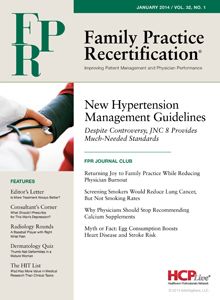Publication
Article
Family Practice Recertification
Myth or Fact: Egg Consumption Boosts Heart Disease and Stroke Risk
Author(s):
A meta-analysis examines the association between the degree of egg consumption and the risk of coronary heart disease (CHD) and stroke.
Frank J. Domino, MD
Review
Rong Y, Chen L, Zhu T, Song Y, Yu M, Shan Z, Sands A, Hu FB, Liu L. Egg consumption and risk of coronary heart disease and stroke: dose-response meta-analysis of prospective cohort studies. BMJ. 2013 Jan 7;346:e8539. http://www.bmj.com/content/346/bmj.e8539.
Study Methods
This meta-analysis was conducted to determine the risk of coronary heart disease (CHD) and stroke by degree of egg consumption, which was measured with food-frequency questionnaires.
Patient Demographics
The combined cohorts examined in this study contained more than 263,000 CHD patients with 3,081,269 person-years of follow-up and more than 210,000 stroke patients with 4,148,095 person-years of follow-up. The authors found 5,847 CHD cases over follow-up periods ranging from 8 to 20 years, and 7,579 stroke cases during a follow-up ranging from 8.8 to 22 years. Three cohorts were comprised of Asian populations, while the remaining studies were conducted in the United States.
Results and Outcomes
There was no evidence of a significant association between egg intake and the risk of CHD or stroke, and even a greater consumption of up to 1 egg per day did not increase CHD or stroke risk. In fact, 4 reports on fatal stroke cases found no increased risk with egg intake. However, a small subset of studies found higher egg consumption was associated with a substantially elevated CHD risk in diabetics, though it was also linked to a reduced hemorrhagic stroke risk in those patients.
No heterogeneity* was observed among the included studies, and regression testing demonstrated no evidence of publication bias.**
Conclusion
This meta-analysis found no significant association between egg consumption and the risk of CHD or stroke, even with higher egg intake. The elevated CHD risk and reduced hemorrhagic stroke risk found among diabetics with greater egg consumption should be analyzed and interpreted with caution, as only a few studies focused on diabetic participants and particular stroke subtypes.
*Heterogeneity is a statistical term that describes the influence of an individual study on an outcome when all studies are combined. In a systematic review, heterogeneity is measured if the methods used in each study could influence the combined outcome. When no heterogeneity is found, it means the variability provided by each study did not corrupt or undermine the combined outcome. ** Publication bias is a potential problem with systematic reviews. It occurs because a systematic review can only include studies that were published in some way. Many negative or nonsignificant studies never get published. To determine if publication bias is present in a study, regression analysis is conducted and represented as a “funnel plot.” If a statistical-chance publication bias is present, the funnel plot will show outliers. When the funnel plot is within its margins of error, no publication bias is suspected.
Commentary
Research data has long suggested that dietary cholesterol influences plasma concentrations of serum cholesterol, but what effect does it have clinically? Epidemiologic studies have found weak or little association between dietary cholesterol intake and cardiovascular disease (CVD) risk.1
Aside from cholesterol, eggs are a good source of high-quality protein and vitamin D. In the Diet, Obesity, and Gene (Diogenes) study,2 an increase in protein consumption and reduction in glycemic index was beneficial for weight control. Substituting protein for carbohydrate also resulted in lower blood pressure, improved lipids levels, and reduced cardiovascular (CV) risk.
Egg consumption has previously been analyzed under the belief that it increases CV risk. In those analyses, regular egg consumption was associated with unhealthy lifestyle factors like smoking and physical inactivity, and a history of higher egg consumption was associated with increased consumption of red and processed meats. However, those confounding factors tended to exaggerate the association between egg consumption and CVD. In contrast, this study separated those factors out to find the CV risk based solely upon egg intake.
The limitations of this meta-analysis included error in egg intake measurement and a detailed separation of dietary, smoking, and exercise habits that may confound individual study results. Nevertheless, statistical analysis accounted for the study’s few limits.
While this meta-analysis found egg consumption does not increase CV or stroke risk in US and Asian populations, further research is needed to determine whether this holds true for diabetics, since only a small amount of data suggested a difference in risk for those patients.
This study supports a shift in how family physicians counsel patients at risk for heart disease and stroke. Tobacco cessation, exercise, and prudent control of blood pressure and serum cholesterol remain proven cornerstones of lowering those risks, but egg reduction or elimination must now join the list of urban myths from 20th-century medical care.
References
1. Kanter MM, Kris-Etherton PM, Fernandez ML, Vickers KC, Katz DL. Exploring the factors that affect blood cholesterol and heart disease risk: is dietary cholesterol as bad for you as history leads us to believe? Adv Nutr. 2012 Sep 1;3(5):711-7. http://advances.nutrition.org/content/3/5/711.full.pdf+html.
2. Gögebakan O, et al. Effects of weight loss and long-term weight maintenance with diets varying in protein and glycemic index on cardiovascular risk factors: the diet, obesity, and genes (DiOGenes) study: a randomized, controlled trial. Circulation. 2011 Dec 20; 124(25): 2829-38.
http://circ.ahajournals.org/content/124/25/2829.full.
About the Author
Frank J. Domino, MD, is Professor and Pre-Doctoral Education Director for the Department of Family Medicine and Community Health at the University of Massachusetts Medical School in Worcester, MA. Domino is Editor-in-Chief of the 5-Minute Clinical Consult series (Lippincott Williams & Wilkins). Additionally, he is Co-Author and Editor of the Epocrates LAB database, and author and editor to the MedPearls smartphone app. He presents nationally for the American Academy of Family Medicine and serves as the Family Physician Representative to the Harvard Medical School’s Continuing Education Committee.






